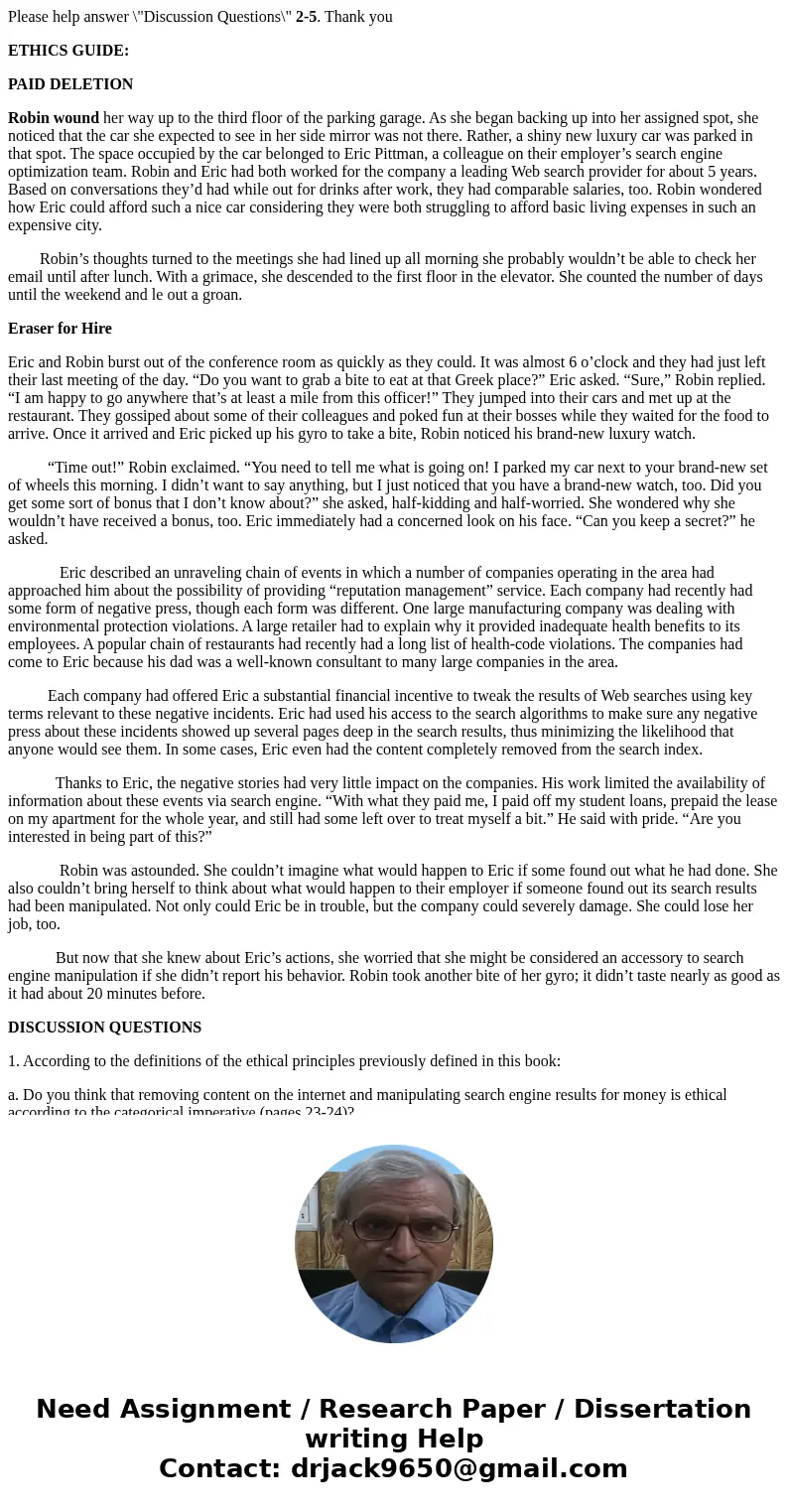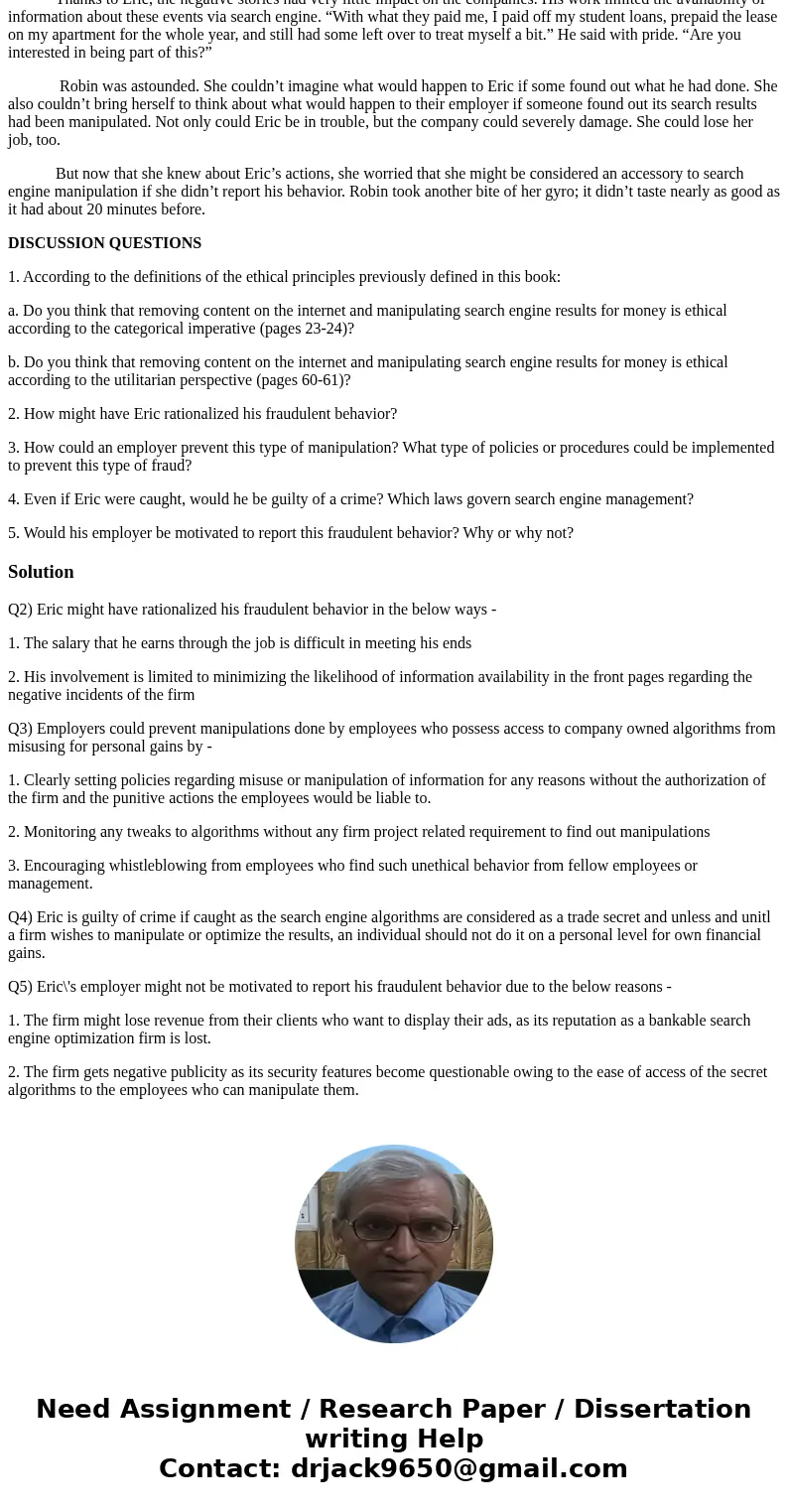Please help answer Discussion Questions 25 Thank you ETHICS
Please help answer \"Discussion Questions\" 2-5. Thank you
ETHICS GUIDE:
PAID DELETION
Robin wound her way up to the third floor of the parking garage. As she began backing up into her assigned spot, she noticed that the car she expected to see in her side mirror was not there. Rather, a shiny new luxury car was parked in that spot. The space occupied by the car belonged to Eric Pittman, a colleague on their employer’s search engine optimization team. Robin and Eric had both worked for the company a leading Web search provider for about 5 years. Based on conversations they’d had while out for drinks after work, they had comparable salaries, too. Robin wondered how Eric could afford such a nice car considering they were both struggling to afford basic living expenses in such an expensive city.
Robin’s thoughts turned to the meetings she had lined up all morning she probably wouldn’t be able to check her email until after lunch. With a grimace, she descended to the first floor in the elevator. She counted the number of days until the weekend and le out a groan.
Eraser for Hire
Eric and Robin burst out of the conference room as quickly as they could. It was almost 6 o’clock and they had just left their last meeting of the day. “Do you want to grab a bite to eat at that Greek place?” Eric asked. “Sure,” Robin replied. “I am happy to go anywhere that’s at least a mile from this officer!” They jumped into their cars and met up at the restaurant. They gossiped about some of their colleagues and poked fun at their bosses while they waited for the food to arrive. Once it arrived and Eric picked up his gyro to take a bite, Robin noticed his brand-new luxury watch.
“Time out!” Robin exclaimed. “You need to tell me what is going on! I parked my car next to your brand-new set of wheels this morning. I didn’t want to say anything, but I just noticed that you have a brand-new watch, too. Did you get some sort of bonus that I don’t know about?” she asked, half-kidding and half-worried. She wondered why she wouldn’t have received a bonus, too. Eric immediately had a concerned look on his face. “Can you keep a secret?” he asked.
Eric described an unraveling chain of events in which a number of companies operating in the area had approached him about the possibility of providing “reputation management” service. Each company had recently had some form of negative press, though each form was different. One large manufacturing company was dealing with environmental protection violations. A large retailer had to explain why it provided inadequate health benefits to its employees. A popular chain of restaurants had recently had a long list of health-code violations. The companies had come to Eric because his dad was a well-known consultant to many large companies in the area.
Each company had offered Eric a substantial financial incentive to tweak the results of Web searches using key terms relevant to these negative incidents. Eric had used his access to the search algorithms to make sure any negative press about these incidents showed up several pages deep in the search results, thus minimizing the likelihood that anyone would see them. In some cases, Eric even had the content completely removed from the search index.
Thanks to Eric, the negative stories had very little impact on the companies. His work limited the availability of information about these events via search engine. “With what they paid me, I paid off my student loans, prepaid the lease on my apartment for the whole year, and still had some left over to treat myself a bit.” He said with pride. “Are you interested in being part of this?”
Robin was astounded. She couldn’t imagine what would happen to Eric if some found out what he had done. She also couldn’t bring herself to think about what would happen to their employer if someone found out its search results had been manipulated. Not only could Eric be in trouble, but the company could severely damage. She could lose her job, too.
But now that she knew about Eric’s actions, she worried that she might be considered an accessory to search engine manipulation if she didn’t report his behavior. Robin took another bite of her gyro; it didn’t taste nearly as good as it had about 20 minutes before.
DISCUSSION QUESTIONS
1. According to the definitions of the ethical principles previously defined in this book:
a. Do you think that removing content on the internet and manipulating search engine results for money is ethical according to the categorical imperative (pages 23-24)?
b. Do you think that removing content on the internet and manipulating search engine results for money is ethical according to the utilitarian perspective (pages 60-61)?
2. How might have Eric rationalized his fraudulent behavior?
3. How could an employer prevent this type of manipulation? What type of policies or procedures could be implemented to prevent this type of fraud?
4. Even if Eric were caught, would he be guilty of a crime? Which laws govern search engine management?
5. Would his employer be motivated to report this fraudulent behavior? Why or why not?
Solution
Q2) Eric might have rationalized his fraudulent behavior in the below ways -
1. The salary that he earns through the job is difficult in meeting his ends
2. His involvement is limited to minimizing the likelihood of information availability in the front pages regarding the negative incidents of the firm
Q3) Employers could prevent manipulations done by employees who possess access to company owned algorithms from misusing for personal gains by -
1. Clearly setting policies regarding misuse or manipulation of information for any reasons without the authorization of the firm and the punitive actions the employees would be liable to.
2. Monitoring any tweaks to algorithms without any firm project related requirement to find out manipulations
3. Encouraging whistleblowing from employees who find such unethical behavior from fellow employees or management.
Q4) Eric is guilty of crime if caught as the search engine algorithms are considered as a trade secret and unless and unitl a firm wishes to manipulate or optimize the results, an individual should not do it on a personal level for own financial gains.
Q5) Eric\'s employer might not be motivated to report his fraudulent behavior due to the below reasons -
1. The firm might lose revenue from their clients who want to display their ads, as its reputation as a bankable search engine optimization firm is lost.
2. The firm gets negative publicity as its security features become questionable owing to the ease of access of the secret algorithms to the employees who can manipulate them.


 Homework Sourse
Homework Sourse